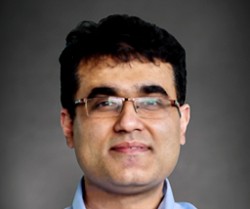
Credit: Kate Myers/Penn State
2023 NSF CAREER Award: Syed Rafiul Hussain
March 3, 2023
UNIVERSITY PARK, Pa. — Syed Rafiul Hussain, assistant professor of computer science and engineering, earned a five-year, $557,183 NSF CAREER Award for a project titled “Principled approaches to securing next-generation cellular networks.”
What do you want to understand or solve through this project?
Cellular networks are the most pervasive and primary means of global-scale communication that enable connectivity for billions of devices worldwide. Despite cellular networks being such core infrastructures, there is a lack of systematic and rigorous security analysis frameworks and secure-by-design principles to ensure secure and reliable operations of these networks. Even though cellular technologies have evolved over generations, trust assumptions have largely remained the same whereas adversary capabilities have significantly grown. The adversary capabilities will thus continue to grow and violate the security guarantees of next-generation cellular networks that we rely on today. Therefore, the overarching goal of this project is to secure the next-generation cellular networks through the development of algorithms and systems that verify the security and privacy guarantees of cellular network protocols' design and implementations with respect to next-generation adversaries that can break the current trust assumptions.
This project aims to improve the security of cellular networks from the ground up by incorporating security analysis starting from the design to implementations and real deployments. Unfortunately, it has been difficult to achieve this vision in practice due to the lack of models and properties for security analysis; of automated and holistic security analysis framework; and of techniques to create correct and secure cellular protocol implementations. This project seeks to address these broad challenges in a unified framework through developing a formal static security analysis framework to scalably analyze the protocol model of the design, that is, the cellular standard of next-generation cellular networks; designing and implementing dynamic security analysis framework for analyzing and verifying the security of cellular protocol implementations; and developing cellular network-specific protocol modeling language and code generation mechanism to produce high-assurance reference implementations of cellular protocols. Results from this work have the potential to fundamentally improve the security of current (5G) and next-generation (6G) cellular networks and could make a significant impact on national and global security.
How will advances in this area impact society?
Cellular infrastructure is the only reliable digital communication system available to the majority of the world's population. The results of this project will not only strengthen existing deployments of cellular networks but also ultimately lead to a set of core security goals for the creation of next-generation cellular standards. We intend for this work to enable transformative changes through substantial engagement with international standard bodies, industry groups, leading manufacturers, network operators, application developers and governments. We plan to responsibly share our tools, models, properties and findings in public domain to promote and advance the science and community of cellular networks, directly benefiting cellular stakeholders and developers.
Will undergraduate or graduate students contribute to this research? How?
Accomplishing the research and educational goals will require significant input from both graduate and undergraduate students. Students will be involved in developing theories, techniques and tools to establish strong security guarantees for the global cellular infrastructure and to prepare the educational content. The project provides a valuable opportunity for students to receive training that will help them grow and develop as researchers. Students interested in participating in this exciting opportunity are encouraged to visit our lab website and reach out to me at hussain1@psu.edu.
The NSF CAREER award not only funds a research project, but it also recognizes the potential of the recipient as a researcher, educator and leader in their field. How do you hope to fulfill that potential?
With the support of this award, I plan to make fundamental improvements to the security of next-generation cellular networks. Toward this, my students and I aim to develop principled security analysis frameworks for cellular network protocols. I also hope to make a significant impact on society by engaging with industry groups, leading manufacturers, network operators and governments to promote and advance the science and community of cellular networks. I also plan to contribute to education and outreach by organizing courses, cellular capture-the-flag competitions and K-12 workshops that focus on the security and privacy of emerging networks and systems. I will make the tools developed from this project and education modules publicly available under open-source licenses as enablers for researchers, educators and industry collaborators to help transition the ideas from research to practice. Overall, I hope to leverage the resources and support provided by the NSF CAREER award and Penn State to make a significant and lasting impact on the field of cellular network security and contribute to the development of a more secure and reliable global communication infrastructure.




